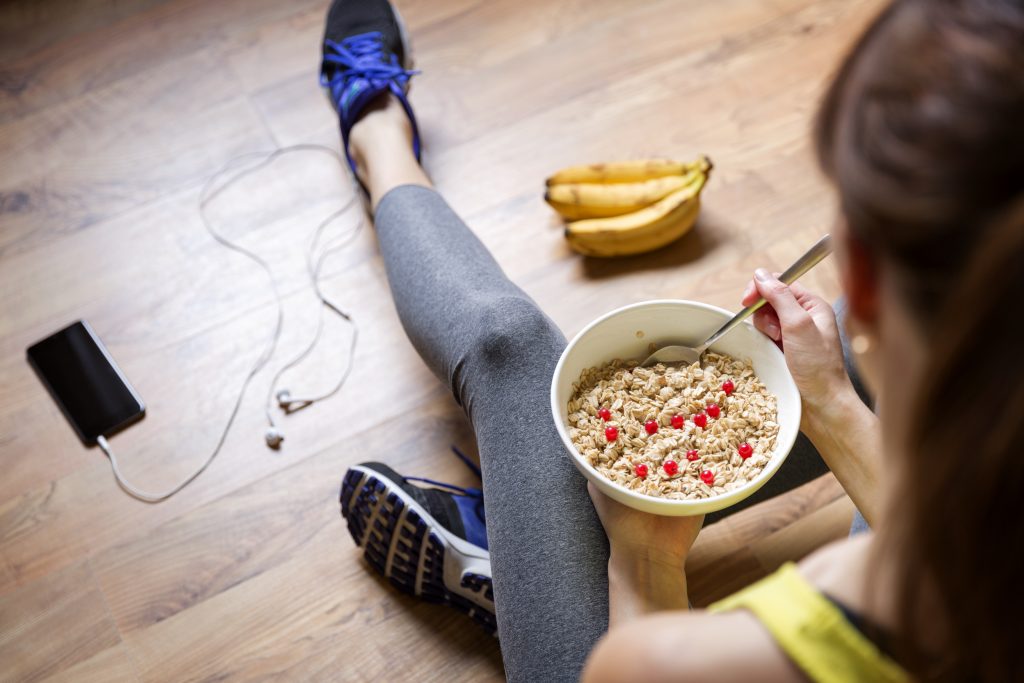Advertisement
Repair And Recover
What to eat after your workout

You drank your pre-workout shake. You stayed hydrated as you sweated it out. But have you given any thought to what you’ll eat and drink when you’ve wiped that sweat off your brow? Your post-workout nutrition is just as important—if not more important—for your athletic performance.
Why your post-workout meal matters
When you exercise, your body undergoes a lot of wear and tear and your muscles burn up their stored glycogen.
And it’s during the recovery process, not during your actual workout, that you get stronger and start to see the benefits of your exercise routine.
That’s why properly fuelling your recovery process is important for <every> athlete. And for some, your post-workout nutrition is even <more> important than your pre- and mid-workout nutrition.
That includes athletes who are on a reduced-calorie diet to lose weight, or those who weren’t able to eat before they exercised.
Post-workout nutrition perks
With the right approach, your post-workout meal will boost your muscle strength and size, soothe muscle soreness and pain, and speed up your recovery so you can hit the gym again sooner.
It’s all about ratios and timing
You need the right combination of carbs to replenish your muscles’ glycogen, and protein for muscle repair.
“An endurance athlete should aim for a 4:1 carbs-to-protein ratio in their post-workout meal,” recommends sports nutritionist Melissa Boufounos. “And a strength and power athlete, or someone looking to lose weight, may drop to a 3:1 ratio.”
In other words, your post-workout shake or meal should offer up approximately 30 grams of protein, plus 90 to 120 grams of carbs (depending on your athletic goals).
Ideally, eat within 60 minutes of working out—that’s when your body needs that food the most.
“I usually time my workouts so that I’m eating right after,” says Boufounos. One of her post-workout go-to meals is pasta with a lean protein and salad. “If I won’t be eating for an hour, I’ll have a snack while I prepare my meal, like a slice of sprouted whole grain bread with peanut butter.”
Don’t forget hydration
Getting hydrated quickly will magnify your recovery and performance. Drink 1 L (32 oz) of fluids for every kilogram of body weight you lost via sweating.
The best post-workout foods and supplements
Simple carbohydrates
Complex carbs were important before you exercised, but you want simpler, higher-glycemic carbs for recovery. Think fruit, rice, bread, or pasta.
Easily digestible protein
Easily digestible protein is more quickly absorbed and thus speeds recovery. Numerous studies report that a protein shake is your best bet. “Within half an hour of my workout, I drink a protein shake mixed with fruit,” says Robert Herbst, a 19-time world champion powerlifter.
Branched-chain amino acids (BCAAs)
When taken after a workout, BCAAs maximize the muscle protein synthesis process (upping it by about 22 percent, according to one study!), thus amplifying repair and recovery. They may also reduce muscle soreness.
Coenzyme Q10
CoQ10 may boost recovery, especially after endurance sports or high-intensity exercise.
Laid up with an injury? Nutrition still matters!
Taking an extended break from the gym often leads to a loss in mobility and muscle strength. Don’t let your efforts go down the locker room drain. Maintaining your healthy nutrition habits helps prevent this.
Keep your protein intake up. In fact, increasing your protein intake to 2 to 2.5 grams of protein per kilogram of body weight per day may support a faster recovery and curtail muscle loss.
And if you’re worried about gaining weight because you aren’t exercising as much, talk to a registered dietitian before dieting. Depending on the type of injury, your body may actually need more calories—not fewer—in order to heal.
The best foods and supplements for injured athletes
Whole plant foods
Increase your intake of micronutrients linked to improved injury recovery: vitamin C, zinc, calcium, vitamin A, and vitamin D. The best food sources of most of these nutrients are plant based, such as fruits, vegetables, legumes, nuts, and seeds. (For vitamin D, a supplement is your safest bet.)
Creatine
Creatine may help prevent muscle loss when you’re injured.
Omega-3s
It’s long been known that omega-3 fatty acids improve injury recovery. These healthy fats also reduce exercise-related muscle soreness, boost workout recovery and performance, and help with joint pain.
Tart cherry juice
It reduces the inflammatory stress triggered by exercise. It also promotes better sleep (elite athletes often struggle with sleep), which further improves recovery.
Curcumin
It may help heal injuries and wounds. It also improves exercise recovery, lowers inflammation, and reduces muscle soreness.
Healthy eating for rest day (and every day)
Take a recovery day every three to five days, or whenever you’re feeling very sore.
On days when you’re not engaging in strenuous exercise, you don’t need to emphasize high-energy, high-glycemic foods (e.g., very high-carb meals, sugar-rich sports drinks, etc.) like you normally would on workout days.
However, most athletes—with the exception of those trying to lose weight—benefit from consuming roughly the same total number of calories that they’d eat on an active day.
Finally, rest days are the perfect opportunity to support your general health beyond exercise. For example, it’s a debunked myth that exercise suppresses your immune system; in fact, it’s good for immune health! But exercising in the gym or in extreme outdoor weather can leave you more susceptible to illness.
Use rest days to eat and supplement with the goal of protecting yourself from illness, wear and tear on your joints, and more. Think of it as nutritional insurance.
The best supplements for nutritional insurance
Ashwagandha
It may improve muscle performance. It also improves the body’s resistance to stress. (Chronic stress negatively impacts physical activity levels and immunity.)
Joint health supplements
Joint pain affects many—if not most—athletes. Some of the most-researched supplements for joint health include curcumin, omega-3s, S-adenosylmethionine (SAM-e), glucosamine, and chondroitin.
Green tea
The healthy compounds in green tea extract have numerous health benefits, including positive impacts on your cardiovascular health, diabetes risk, inflammation, and more.
Natural jet fuel
In the blockbuster movie franchise Fast & Furious, supercars go super fast thanks to nitrous oxide. For athletes, it’s nitric oxide that has similar performance-enhancing properties. Your body converts nitrates in vegetables into nitric oxide.
Nitrates 101
| Performance benefits | Healthy nitrate sources |
| Nitrates in vegetables boost your endurance, in part by boosting the flow of oxygen-rich blood to your muscles. | Beetroot juice is the most commonly used nitrate supplement for athletes. Other nitrate-rich foods include celery, spinach, rhubarb, arugula, and dill (all of which generally have more nitrates than beets). |
| Nitrate dosage | Nitrate timing |
| “The optimal dosage of nitrate supplementation tends to be 6.4 mg to 12.8 mg per kg of body weight, which means a 150 lb (68 kg) person would need to consume at least 500 g of beetroot,” says Boufounos. | For the best results, take your nitrate supplement (or nitrate-rich veggies) a couple of hours before you exercise. |
Ideas to fuel your workout while travelling
These foods and supplements are either a) easy to find just about anywhere, or b) lightweight and easy to pack.
Restaurant fare
Head to a sandwich shop, opting for lean protein, extra veggies, and whole grain bread (avoid rich or sugary condiments). Alternatively, grab a veggie burrito at a Mexican restaurant.
Chocolate milk
It has a great ratio of carbs to protein, and studies show it boosts recovery.
Dried fruit bars
Fig bars and similar products pack a big hit of easily digestible carbohydrates.
Trail mix
It’s easy to grab and go, and it packs a protein-, fat-, and carb-rich punch.
Protein powder and bars
You can buy protein powder in single-serve pouches; just remember to pack a shaker bottle. A protein bar is another convenient option for travellers.





